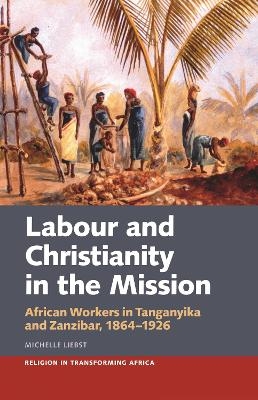
Labour & Christianity in the Mission
African Workers in Tanganyika and Zanzibar, 1864-1926
Seiten
2021
James Currey (Verlag)
978-1-84701-275-3 (ISBN)
James Currey (Verlag)
978-1-84701-275-3 (ISBN)
Important and broadening study of the way Africans engaged with missions, not as beneficiaries of humanitarian philanthropy, but as workers.
The important role missions played as places of work has been underexplored, yet missionaries were some of the earliest Europeans who tried to control African labour. African mission workers' roles were not just religious and educational, as they were actively involved, not always voluntarily, in building and domestic work. Focusing on the Anglican Universities' Mission to Central Africa (UMCA) in Tanganyika and Zanzibar in the late 19th and early 20th centuries, Michelle Liebst shows how missionaries both supported and undermined the livelihood trajectories of Africans. Revealing the changing nature of relations over time between missionaries - who referred to themselves as "workers" - and the African mission workers, including teachers and priests - whom missionaries referred to as "helpers" - reflected broader political transformations, and this innovative study of missions' role in society adds a critical dimension to our understanding of their function and socio-economic impact and the history of Christianity in Africa.
The important role missions played as places of work has been underexplored, yet missionaries were some of the earliest Europeans who tried to control African labour. African mission workers' roles were not just religious and educational, as they were actively involved, not always voluntarily, in building and domestic work. Focusing on the Anglican Universities' Mission to Central Africa (UMCA) in Tanganyika and Zanzibar in the late 19th and early 20th centuries, Michelle Liebst shows how missionaries both supported and undermined the livelihood trajectories of Africans. Revealing the changing nature of relations over time between missionaries - who referred to themselves as "workers" - and the African mission workers, including teachers and priests - whom missionaries referred to as "helpers" - reflected broader political transformations, and this innovative study of missions' role in society adds a critical dimension to our understanding of their function and socio-economic impact and the history of Christianity in Africa.
MICHELLE LIEBST is a Research Fellow at University College London.
Introduction: Rethinking Missions as Places of Work
Missionary Authority in Late Precolonial Magila, 1867 - 1887
Building the Slave Market Church in Zanzibar, 1864 - 1900
Slave Status and the Mission Boys' School in Zanzibar, 1864 - c.1930
"Mbweni girls" and Slave Status in Zanzibar, 1864 - c.1930
Domestic Service in Magila and Zanzibar, 1864 - c.1930
Conclusion
| Erscheinungsdatum | 12.10.2021 |
|---|---|
| Reihe/Serie | Religion in Transforming Africa |
| Zusatzinfo | 4 line illus. |
| Verlagsort | Oxford |
| Sprache | englisch |
| Maße | 156 x 234 mm |
| Gewicht | 376 g |
| Themenwelt | Geschichte ► Teilgebiete der Geschichte ► Religionsgeschichte |
| Sozialwissenschaften ► Soziologie ► Mikrosoziologie | |
| ISBN-10 | 1-84701-275-2 / 1847012752 |
| ISBN-13 | 978-1-84701-275-3 / 9781847012753 |
| Zustand | Neuware |
| Informationen gemäß Produktsicherheitsverordnung (GPSR) | |
| Haben Sie eine Frage zum Produkt? |
Mehr entdecken
aus dem Bereich
aus dem Bereich
Von den Anfängen bis zur Gegenwart
Buch | Hardcover (2022)
C.H.Beck (Verlag)
CHF 47,60
Herkunft, Blüte, Weg nach Osten
Buch | Hardcover (2024)
C.H.Beck (Verlag)
CHF 55,90


